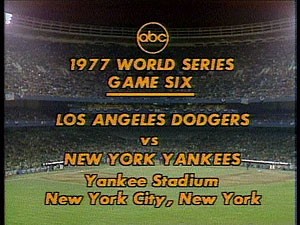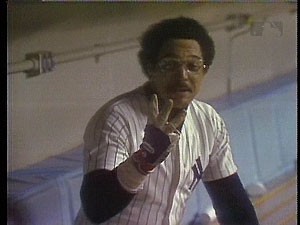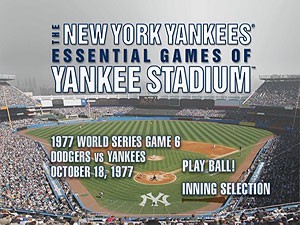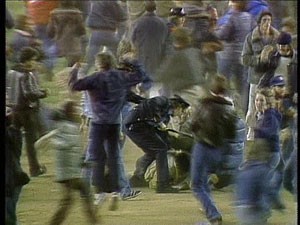| Reviews & Columns |
|
Reviews DVD TV on DVD Blu-ray 4K UHD International DVDs In Theaters Reviews by Studio Video Games Features Collector Series DVDs Easter Egg Database Interviews DVD Talk Radio Feature Articles Columns Anime Talk DVD Savant Horror DVDs The M.O.D. Squad Art House HD Talk Silent DVD
|
DVD Talk Forum |
|
|
| Resources |
|
DVD Price Search Customer Service #'s RCE Info Links |
|
Columns
|
|
|
New York Yankees Essential Games of Yankee Stadium
Remembering better times in the House that Ruth Built
 Reviewer's Bias*
Reviewer's Bias*
Loves: The Yankees
Likes: The concept of baseball
Dislikes: The reality of baseball, travelling to da Bronx
Hates: The Sawks
The Games
It really shouldn't have ended this way. The final season in the most storied stadium in baseball shouldn't go into the books as a tale of the utter failure of millionaires to get the job done. It's simply not dignified. Not after all of the history that has been made on that patch of grass in the Bronx. But unfortunately, that's the reality that Yankee Stadium faces. It's hard to complain much about this one off season when you consider how many victories were celebrated in those hallowed halls.
Here, on six DVDs are six of the most memorable from the age of television (which points out how long the Yanks have been winners, since there were many, many more wins back before video.) Selected by fans via the Yankees' web site, the picks are mostly predictable, including a big win over the hated Red Sox, a historic October evening and a few selections from the modern-era New York powerhouses, as well as one immensely emotional night that was as much a loss as a win.
Things get started with Game 5 of the 1976 ALCS against the Kansas City Royals. Broadcast on ABC by the announcing team of Keith Jackson, Howard Cosell and Reggie Jackson, the game is so basic in comparison to today's game, as Keith Jackson announces in a very explanatory way, without the cliches that broadcasting is loaded with today, while Cosell and Jackson provide entertaining analysis (though Reggie is a bit simplistic in his view of the game.) The game is here mainly because of how it ended, as the Royals got off to a 3-2 lead, only to fall behind 6-3, before tying things up in the 8th. That set up Yankees slugger Chris Chambliss, who bashed a walk-off homer that led to bedlam as the crowd stormed the field and basically assaulted him. It's really a frightening scene, and must have been terrifying for the players, as the fans were simply animals.
 History repeated itself in 1977, represented here by the World Series clinching Game 6 against the L.A. Dodgers. Reggie Jackson solidified his place in baseball history that night, hitting three home runs on the first pitches he faced (giving him four homers on his last four swings in the series.) Thanks to Jackson's offense, this was more of a blow-out, so the focus is really on the fans' attack on the field following the victory. Jackson actually had to take the field in a batting helmet to protect himself, and when the final out was recorded, he ran like a running back to the locker room, exploding through fans running at him, sending them to the ground sprawling. Again, it's frightening, but great to see these morons get devastated by his shoulder. Also entertaining is the ABC presentation, as the announcers (with Tom Seaver taking over for Reggie in the booth) talk about the players' crazy salaries ($60,000 a season?!) and they play a featurette about how to thrown pitches (including animation.)
History repeated itself in 1977, represented here by the World Series clinching Game 6 against the L.A. Dodgers. Reggie Jackson solidified his place in baseball history that night, hitting three home runs on the first pitches he faced (giving him four homers on his last four swings in the series.) Thanks to Jackson's offense, this was more of a blow-out, so the focus is really on the fans' attack on the field following the victory. Jackson actually had to take the field in a batting helmet to protect himself, and when the final out was recorded, he ran like a running back to the locker room, exploding through fans running at him, sending them to the ground sprawling. Again, it's frightening, but great to see these morons get devastated by his shoulder. Also entertaining is the ABC presentation, as the announcers (with Tom Seaver taking over for Reggie in the booth) talk about the players' crazy salaries ($60,000 a season?!) and they play a featurette about how to thrown pitches (including animation.)
With not much happening in the Stadium in the '80s, the set jumps ahead to the '90s, and the 1995 ALDS between the Yanks and the Seattle Mariners. Game two would be the last game long-time team captain Don Mattingly would play in Yankee Stadium, playing out his career between two championship eras and never seeing the World Series. There's a definite sadness to his career, which was cut short by back injuries and unfortunately held out of the Hall of Fame despite an incredible nine Gold Glove awards, but with his number retired by the Yankees and a spot in Yankee Stadium's Monument Park, he'll never be forgotten. This game, a back-and-forth struggle between the two teams, stretched an immense 15 innings, before Jim Leyritz ended it with a walk-off smash. With homers by Mattingly and play-off hero Paul O'Neill, and an early stand-out performance by future star-closer Mariano Rivera, it set the stage for the championship seasons to come, and unlike some games in these essential collections, has meaning well beyond the final play. The importance of the game to Mattingly was only known in retrospect though, which makes it all the more bittersweet.
"A humble man of grace and dignity, a captain who led by example, proud of the pinstripe tradition and dedicated to the pursuit of excellence, a Yankee forever." - Don Mattingly's plaque in Monument Park
At this point in the Yankees chronology, we arrive at the time of the modern era of New York dominance, during which the team won four World Series championships in five year. In this set, those years are represented by just one game though, the first series clincher, from 1996, when they down the Atlanta Braves in six games. It was an emotional evening, two days past Yankees manager Joe Torre's brother's publicly-followed heart transplant, and the final inning made for a closer game than New York certainly would have liked, with a somewhat controversial foul ball thrown in for good measure. As one could expect from a city taking it's first title since 1978, the scene is electric, but impressively, the fans were able to contain their revels to the stands, leaving the players to enjoy their victory instead of running scared, unlike the creeps back in the '70s. So much for the thought that we slid backwards as a civilization.
Like the game against the Mariners in 1995, Game Four in the 2001 World Series, against the Arizona Diamondbacks, came as part of an overall losing cause, despite feeling like a team of destiny. A little more than a month after New York was attacked on 9/11, the Yankees were carrying the hopes of a battered city, and down 2-1 in the series, needed to change the tide. A pitchers' duel between Arizona's Curt Schilling and New York's Orlando Hernandez gave way to a short see-saw battle late in the game, thanks to the relievers giving up the ghost. Expanding on his own outstanding resume, Derek Jeter followed up on Tino Martinez' two-out, bottom of the night game-tying homer with a game-winner of his own in the 10th.
The final entry comes from the long-running rivalry between the Yankees and the Boston Red Sox, and it's a rather appropriate choice, not just because it featured an extra-innings, Game-Seven walk-off home-run, but because Game Seven of the 2003 ALCS was the last time the Curse of the Bambino would crush the hopes of Red Sox Nation. Overcoming an early 4-0 deficit, pulling even only in the bottom of the eighth, it was a tense game that gave way to what felt like desperation, as even the usually boisterous Yankee Stadium crowd felt tired. Then, before anyone could even tell what happened, Aaron Boone, he of the awful post-season batting average, stepped up, swung at the first pitch of the bottom of the 11th and sailed it to left field for the win. Even more shockingly, the announcers, joined, in a bit of kismet, by Boone's brother Bret in the booth, managed to stay silent during the celebration, creating an emotional bit of sports television.
As interesting as it is to see the way baseball has changed, both as a game and a TV product, and as meaningful as these games are to fans of the Bronx Bombers, there is at least one problem with this set, and it's an annoying one at that, as, for some reason, the games are not complete. Sure, all the action on the field is there, but at times, you'll join the show in-progress (it would have been nice to see that first pitch by Scooter, but oh well,) and you always say good-bye shortly after the final out, without any kind of real post-game analysis. In fact, on the disc for the '96 World Series victory, the celebration is edited, cutting out some of the memorable moments. It's not as if the material isn't available and it's not likely there are rights issues, as some of the post-game footage is actually found among the extras. The result makes the game feel much less archival than it should, as no fan would just change the channel after any of these games concluded.
 The DVDs
The DVDs
A classy package for a classy stadium. A&E uses the same style for all their "essential" sets, with a six-disc set (one disc per game) held, overlapped, in an impressive steelbook case, two inside each cover, and two more on an additional tray. The disc art shows the date of the game, the team logos, a one-line synopsis and the inning-by-inning box score. The DVDs feature a simple static full-frame menu with two choices: play the game or select an inning (with a bonus feature option on the final disc. The inning selection menu is well-done, as you move the cursor around the box score of the game, and choose either the top or bottom of the innings. There are no audio options, no subtitles and no closed captioning.
The Quality
There's a note at the start of each DVD about imperfections in the video that were in the original material, and it normally comes in the form of problems around the edge of the frame, like you'd see on an oft-re-recorded VHS tape.The quality of the full-frame video here varies with the age of the games, but the set avoids video from the '80s, as those were dark days in the Bronx, so the quality is good all around. The older stuff is obvious grainier and softer, but it still looks nice, while the graphics on the mid-'90s games are somewhat harsh.
The games are presented with Dolby Digital 2.0 tracks that deliver the play-by-play, commentary and in-game audio clearly, no matter the age. More recent games come off a bit stronger, but overall the delivery is solid, spitting the mix down the middle, without any dynamic aspects.
The Extras
All of the extras are held on the sixth disc, and are made up of highlights and interviews with players and staff. There's some legendary content here, like Jeter's memorable 2004 dive into the stands that left his face bloody, Ron Guidry's 18-strikeout performance in 1978 and the controversial Jeffrey Maier-assisted home run from the 1996 ALCS, along with interviews with players including Chris Chambliss, celebrities like Billy Crystal and Rudy Giuliani and Yankees GM Brian Cashman. The 13 clips, which run 48 minutes in all, are just what a casual fan would want from Yankees Stadium history, though some editing decisions are a bit disappointing, like limiting Guidry's section to only the final strike-out pitches. Also, labels for the people sitting down for interviews would be appreciated, as not everyone is all that recognizable.
The clips:
- Bobby Murcer hits the game-winner, 8/6/79 (Day of Munson's funeral)
- "The Dive" by Derek Jeter, 7/1/04
- Ron Guidry 18 Ks, 6/17/78
- 1996 ALCS Game 1: Fans aid Jeter's home run
- 1999 ALCS Game 1: Bernie Williams' walk-off home run beats Boston
- 2001 World Series Game 5: Brosius/Soriano win it
- 2000 World Series Game 1: First Subway Series since 1956
- Chris Chambliss on his 1976 ALCS Game 5 home run
- 1999 World Series Game 3: Curtis' walk-off home run
- 1978 ALCS Game 3: Munson's clutch home run
- 1978 World Series Game 4: Pinella wins it in extra innings
- Interviews on Reggie Jackson's 3 home runs
- 2003 ALCS vs Boston: Player and Celebrity Interviews
 The Bottom Line
The Bottom LineFor a Yankees fan, this set represents a proud winning tradition, as well as some bitter memories, as a few of the big victories were on the road to disappointing defeats. Still, it's a rather entertaining collection, as much for the play on the field as the presentation and time-capsule qualities. Once you get past the excellent packaging, the DVDs look and sound nice for the age of the material, and there's a small, but enjoyable collection of extras. The value of the set lies in whether you enjoy watching old games or just highlights, as there are other sets that offer more narrative overviews of the team's history.
Francis Rizzo III is a native Long Islander, where he works in academia. In his spare time, he enjoys watching hockey, writing and spending time with his wife, daughter and puppy.Follow him on Twitter
*The Reviewer's Bias section is an attempt to help readers use the review to its best effect. By knowing where the reviewer's biases lie on the film's subject matter, one can read the review with the right mindset.
|
| Popular Reviews |
| Sponsored Links |
|
|
| Sponsored Links |
|
|
| Release List | Reviews | Shop | Newsletter | Forum | DVD Giveaways | Blu-Ray | Advertise |
|
Copyright 2024 DVDTalk.com All Rights Reserved. Legal Info, Privacy Policy, Terms of Use,
Manage Preferences,
Your Privacy Choices | |||||||














